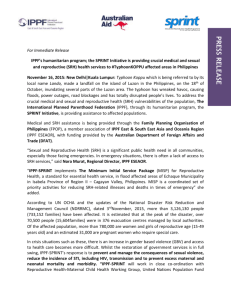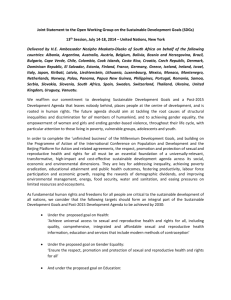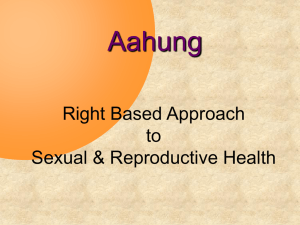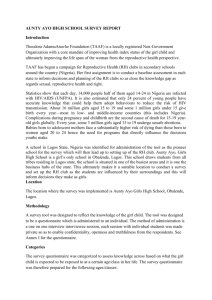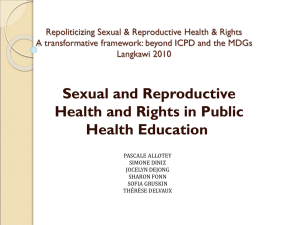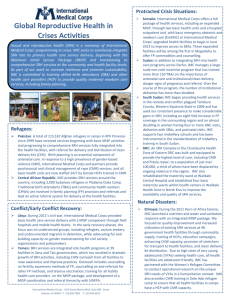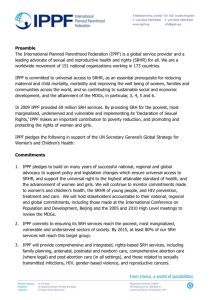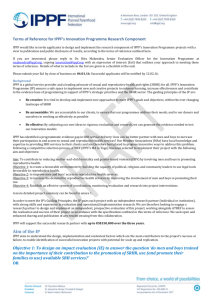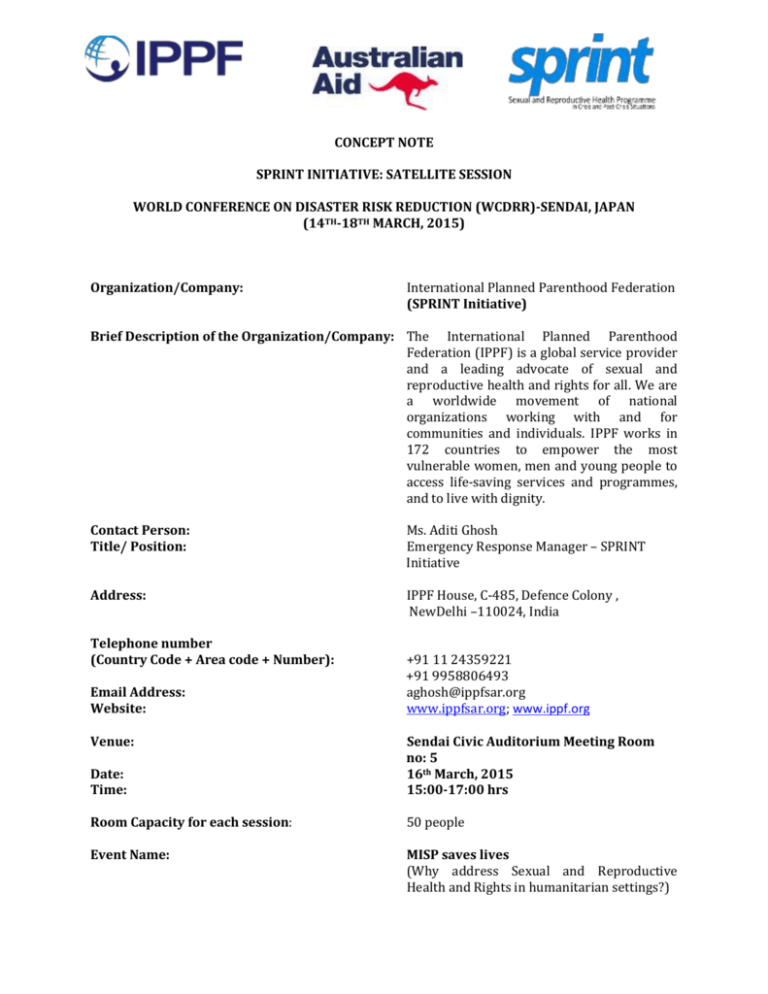
CONCEPT NOTE
SPRINT INITIATIVE: SATELLITE SESSION
WORLD CONFERENCE ON DISASTER RISK REDUCTION (WCDRR)-SENDAI, JAPAN
(14TH-18TH MARCH, 2015)
Organization/Company:
International Planned Parenthood Federation
(SPRINT Initiative)
Brief Description of the Organization/Company: The International Planned Parenthood
Federation (IPPF) is a global service provider
and a leading advocate of sexual and
reproductive health and rights for all. We are
a worldwide movement of national
organizations working with and for
communities and individuals. IPPF works in
172 countries to empower the most
vulnerable women, men and young people to
access life-saving services and programmes,
and to live with dignity.
Contact Person:
Title/ Position:
Ms. Aditi Ghosh
Emergency Response Manager – SPRINT
Initiative
Address:
IPPF House, C-485, Defence Colony ,
NewDelhi –110024, India
Telephone number
(Country Code + Area code + Number):
Email Address:
Website:
Venue:
+91 11 24359221
+91 9958806493
aghosh@ippfsar.org
www.ippfsar.org; www.ippf.org
Date:
Time:
Sendai Civic Auditorium Meeting Room
no: 5
16th March, 2015
15:00-17:00 hrs
Room Capacity for each session:
50 people
Event Name:
MISP saves lives
(Why address Sexual and Reproductive
Health and Rights in humanitarian settings?)
Brief Description of Event
Why address Sexual and Reproductive Health and Rights (SRHR) in humanitarian settings?
The Context: Sexual and reproductive health problems account for the leading cause of women’s ill
health and death worldwide. Yet, almost all maternal deaths can be preventable. Gender based
violence accounts for as much death and disability among women aged between 15 to 44 as cancer
– and the total figure is more than that of malaria, vehicle accidents and war. Thus, neglecting
reproductive health needs has serious consequences:
Preventable maternal and infant deaths and permanent disability of women and girls;
Unplanned and unintended pregnancies due to lack of family planning;
Life threatening complications from unsafe abortions;
Spread of sexually transmitted infections including HIV; and
Gender-based violence including rape, domestic violence, trafficking and sexual exploitation.
In humanitarian crisis situations, SRH needs increase significantly. There are 51.2 million internally
displaced people (IDP) in the world in 2013 (UNHCR), uprooted from their homes by armed conflict
and/or natural disaster from which 75 – 80% are women, young people and children. The average
duration of displaced situations is now 17 years and that is enough time for a woman to get
pregnant, have a child and for the child to reach adolescence. Approximately 25% of displaced
women of reproductive age will be pregnant, 15% of all deliveries will incur complications and 5%
of these women will require a caesarean section to save their life and deliver their baby. These
women and IDP are at an increased risk of:
Sexual violence;
Higher STI/HIV transmission;
Lack of contraceptives, which will in turn increase unwanted pregnancy;
Malnutrition and epidemics due to risks of pregnancy complications;
Childbirth occurs on the wayside during population movements; and
Lack of access to emergency obstetric care increases risk of maternal death and disability
SPRINT Initiative: To address these aforementioned challenges, 1IPPF with funding support from
Department of Foreign Affairs and Trade (DFAT) under Australian Government is spear heading
2SPRINT Initiative- to address SRH in humanitarian settings. SPRINT is a rights-based initiative that
aims, through its activities, at upholding the right to life, dignity and security of person with the
right to the highest attainable standard of reproductive health - for individuals living in crisis and
post-crisis situations.
Despite its importance, SRH is not yet systematically integrated into humanitarian setting and in
the management of post-crisis situations globally. Disaster Risk Reduction initiatives do not quite
include issues related to reproductive health in crisis. This gap was particularly observed following
the Tsunami in the year 2004. Thus, SPRINT was developed in order to address the current gap of
SRH in crisis and post-crisis situations mostly through the implementation of the 3Minimum Initial
Service Package (MISP) for SRH in crises.
1
The International Planned Parenthood Federation (IPPF) is a global service provider and a leading advocate of sexual and reproductive health
and rights for all. It is a worldwide movement of national organizations working with and for communities and individuals.
2
The SPRINT Initiative is a Sexual and Reproductive Health (SRH) Programme in Crisis and Post-Crisis Situations. It is an Australian
Government funded initiative, managed by the International Planned Parenthood Federation.
3
The Minimum Initial Service Package (MISP) for Reproductive Health is a priority set of life‐saving
activities to be implemented at the onset of every humanitarian crisis. The MISP is an international standard as outlined in the Sphere
Humanitarian Charter and Minimum Standards in Disaster Response.
The Side Event: This session will debate and discuss the needs and challenges for Reproductive
Health Services in humanitarian settings ( pre, during and post crisis) and share some good
practices across the globe through collaborative approach by SPRINT initiative. Taking into
account the success the Hyogo Framework of Action (HFA) where efforts were made for
Government Policies and Programmes to be more supportive towards Disaster Risk Reduction/
Preparedness and also reducing disaster risk at local, national, regional and global levels by
countries and other stakeholders, the session will deliberate upon the strategies and plan of action
for the Post 2015 Framework of Action for disaster Risk reduction based on the Zero Draft
Document. The session will be based on evidence based experiences and documentation with
regards to implementation of MISP and various Disaster Risk Reduction Strategies which have been
core to the SRH in crisis.
Providing a diverse context to the Disaster Risk Reduction and Preparedness Strategies with
regards to advocating for Sexual and Reproductive Health and Rights during crisis by taking into
account the experiences of Africa, East South East Asia and Oceania and South Asia Regions. Some
of the key highlights of the session will be:Deliberations and Discussions on raising awareness on disaster risk especially on
importance of addressing SRH in crisis and post-crisis situations at the national, regional
and international levels. Working with Governmental bodies for timely response to SRH
needs in crisis situations and enhances the access to SRH information and services for
persons surviving crisis and living in protracted post-crisis situations.
The Existing Policies and practices for disaster risk management and understanding of risk
in all its dimensions of vulnerability, capacity and exposure of persons.
Building the capacity of local government officials, public servants, communities and
volunteers on MISP through sharing of experience, training and learning programmes on
disaster risk reduction and implementation of disaster-risk related policies and plans;
The need for Investment on research and innovative mediums to promote a solution-driven
research for disaster risk management to better address gaps, societal challenges and emerging
risks and interdependencies;
Also to advocate for the incorporation of disaster risk education, including preparedness
particularly on MISP and SRH needs, in educational curricula especially in professional
education for Doctors and Nurses.
The session will use audio-video presentations and panel discussion which will include
Parliamentarians/Policy Makers, Field Implementers and Civil Society.

